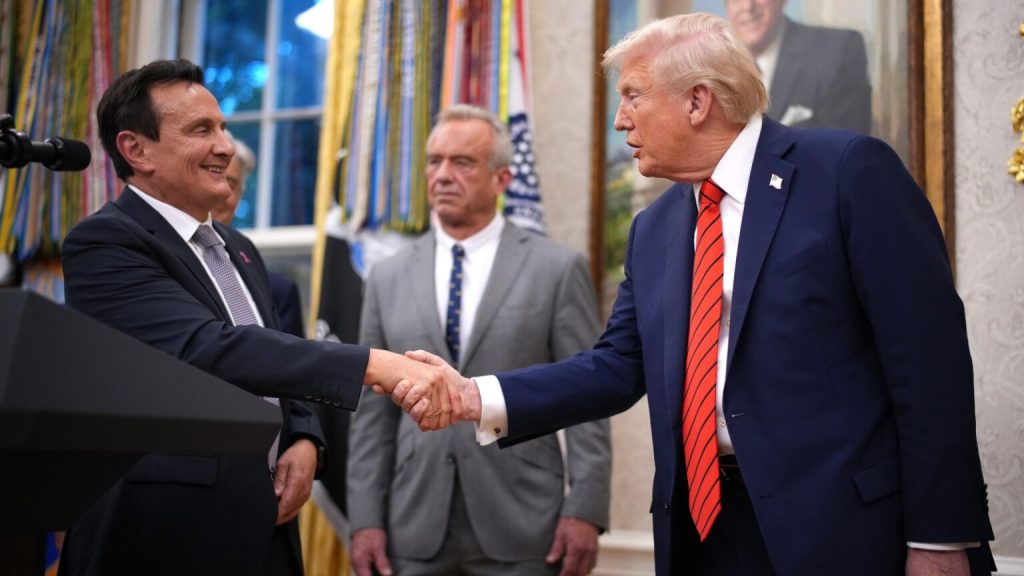
President Donald Trump on Friday announced a landmark agreement with pharmaceutical giant AstraZeneca that will significantly lower prescription drug prices in the U.S. by tying them to the lowest prices offered in other developed nations.
The deal expands the administration’s “most-favored-nation” (MFN) pricing policy, which aims to ensure that American consumers no longer pay more for prescription medications than patients in other wealthy countries.
The announcement, made during an Oval Office event with AstraZeneca CEO Pascal Soriot, follows a similar agreement reached earlier with Pfizer and marks the second major pharmaceutical pricing deal under Trump’s executive order to reduce drug costs for Medicaid and direct-to-consumer sales.
Key Terms of the Agreement
Under the MFN model, AstraZeneca will offer Medicaid programs in all 50 states the lowest price available for each of its drugs in any developed country. The White House says the move could save hundreds of millions of taxpayer dollars annually, while helping roughly 9 million patients who currently rely on AstraZeneca’s medications.
“For years, Americans have paid the highest prices in the world for prescription drugs,” Trump said. “Today, AstraZeneca is committing to change that, offering all of their prescription medications to Medicaid at the most-favored-nation price—the lowest price anywhere in the world.”
The agreement covers a wide range of medications, including treatments for asthma, COPD, cardiovascular disease, and cancer.
Investment in U.S. Manufacturing
In addition to the pricing reforms, AstraZeneca has committed to investing $50 billion in U.S.-based manufacturing and R&D by 2030. As part of that effort, the company will build a new pharmaceutical production facility in Charlottesville, Virginia, expected to create 3,600 jobs.
The Virginia site will focus on producing active pharmaceutical ingredients used in respiratory and oncology medications—an effort the White House says will strengthen domestic supply chains and reduce dependence on overseas manufacturing.
Dramatic Price Cuts for Key Drugs
The administration highlighted steep discounts for specific medications. For example:
- BEVESPI AEROSPHERE (COPD treatment): up to 654% price reduction
- AIRSUPRA (asthma inhaler): 96% price cut for direct buyers
The company will also participate in a federal direct-to-consumer drug purchasing platform currently in development by the Department of Health and Human Services (HHS). The platform, branded “TrumpRx,” will allow patients to buy medications directly from manufacturers at significantly reduced prices.
Building on the Pfizer Agreement
The AstraZeneca deal follows a similar MFN agreement reached with Pfizer just 10 days earlier. Under that arrangement, Pfizer agreed to:
- Provide lower prices to Medicaid programs
- Sell medications—including vaccines, cancer treatments, and blood thinners—through TrumpRx at average discounts of 50%
Both agreements are part of Trump’s broader effort to narrow the price gap between U.S. and foreign prescription drug markets. The White House argues that Americans have long subsidized lower drug prices abroad, as foreign governments negotiate aggressively while U.S. federal programs like Medicare face limits on price negotiations.
According to administration data, U.S. patients pay over three times more than those in other high-income nations for identical medications—even after factoring in insurance and rebates.
“Putting American Patients First”
The White House emphasized that this new pricing model is designed to prevent pharmaceutical companies from charging inflated prices to American patients while offering deep discounts overseas.
“This agreement will bring immediate relief to millions of Americans struggling with the cost of their medications,” President Trump said. “It’s another step in putting American patients first.”
Officials also framed the agreement as part of a larger effort to ensure national health security by rebuilding domestic pharmaceutical infrastructure and ensuring affordable access to critical medications.
Leave a Reply